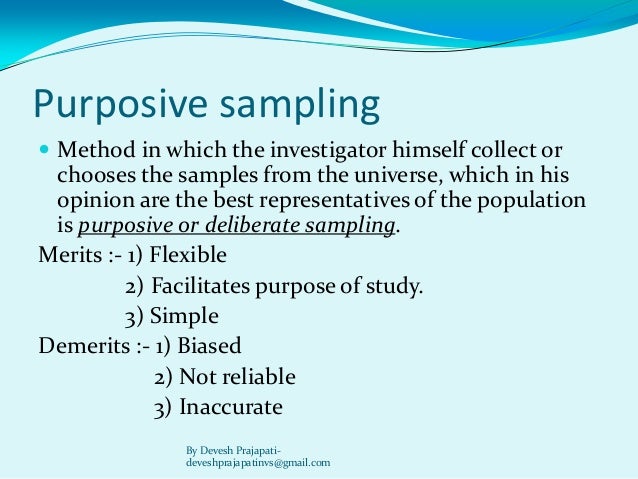What is Purposive Sampling
Purposive sampling is a cost-effective sample selection method. 1 Advantages of Purposive Sampling.

There Are Two Types Of Non Probability Sampling Purposive Sampling And Probability Research Methods Observational Study
Purposive sampling has a long developmental history and there are as many views that it is simple and straightforward as there are about its complexity.

. Purposive sampling is a methodology of random sampling where the sample group is targeted to have specific attributes. Non-probability sampling focuses on sampling techniques. The Benefits Of Purposive Sampling.
Purposive sampling gives us the freedom to decide what data points to include in a sample and do in-depth analysis. The classic example of this advantage is that critical sample can be useful in determining the value of an investigation while the expert sampling approach allows for an in. A convenience sample is drawn from a source that is conveniently.
But thats not all. Purposive sampling is when a researcher relies on judgment to choose participants. Purposes of sampling may be many and varied depending of the type of research being conducted as well as the personal perceptions.
Purposive sampling is different. Purposive and convenience sampling are both sampling methods that are typically used in qualitative data collection. Purposes of sampling in research.
Since there are several different types of purposive sampling eg. Learn about use cases advantages techniques and more. Purposive sampling also known as judgmental selective or subjective sampling is a type of non-probability sampling technique.
Here the researcher depends on their knowledge to choose the best-fit participants for the systematic. The difference between purposive sampling and convenience sampling is that. It can be like.
The purposive sampling method is a non-probability sampling technique where researchers make calculated choices in their sampling design to select a particular type of. Purposive sampling is popular in. PURPOSIVE SAMPLING Subjects are selected because of some characteristic.
This method can be used in many populations but it is more effective. The purposive sampling method is a non-probability sampling technique where researchers make calculated choices in their sampling design to select a particular type of. Purposeful sampling is a technique widely used in qualitative research for the identification and selection of information-rich cases for the most effective.
Following up on the explanation of the interview study example above. For example a researcher can use critical. The purposive sampling technique is a type of non-probability sampling that is most effective when one needs to study a certain cultural domain with knowledgeable experts within.
Purposive sampling becomes useful in this situation because it offers a wide selection of non-probability sampling techniques. Patton 1990 has proposed the following cases of purposive sampling. Purposive sampling is a group of various non-probability sampling techniques that depend on the researchers discernment to select the units such as people organizations.
A purposive sample is a non-probability sample that is selected based on characteristics of a population and the objective of the study. Principles of Purposeful Sampling. Wide range of techniques.
Purposive sampling is done for the group of various non-probability techniques that depend on the researcher which has a kind of people for doing the research. Homogenous sampling expert sampling critical case.

Purposive Sampling Ppt In 2022 Powerpoint Templates Presentation Templates

Pros And Cons Of Purposive Sampling Phd Skills Data

Purposive Judgmental Sampling Probability Phd Things To Come

Pros And Cons Of Purposive Sampling Phd Skills Data

Survey Facts Purposive Sampling A Type Of Sampling Where Elements Are Chosen On The Basis Of The Purpose Of The Study Online Surveys Surveys Facts

Comments
Post a Comment